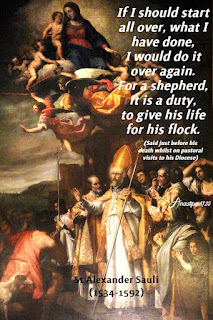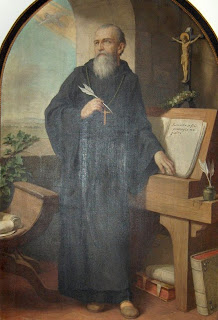Feast Day: Sept 27Early Years
Born at Pouy, a village in southwestern, France, in April 24, 1581 to a peasant family. Vincent was faithful to his studies as well as to his duties, spending a good part of his early years working in the fields and tending the sheep. His father arranged for him to attend a Franciscan school and soon after went to study theology in Toulouse University.
Vincent was ordained in 1600 during which France was suffering from the effects of religious wars. Large parts of the country had converted to Protestantism, some had abandoned their faith and most seminaries closed doors.
Charity in Action
Pierre de Bérulle, a well-known priest and leader of a movement of church renewal became Vincent’s confessor and spiritual director. At the request of M. de Berulle, Vincent took charge of the poor rural parish of Clichy near Paris, but several months later, he was called back to Paris to serve as a tutor for the children of Philippe-Emmanuel de Gondi, an illustrious French family. He also became the chaplain and gave missions to the peasants working in the family’s vast estate. In January 1617, while giving a sermon on confession, the peasants responded so overwhelmingly that additional priests had to be called in to help hear confessions.
It was during Vincent’s period of spiritual darkness that he was convinced he was meant to serve the poor. He left the Gondi and with the approval of M. de Berulle, was made curé of Chatillon-les-Dombes. As he was preparing for Mass, a parishioner told him of a poor family in need of help. Deeply moved, he urged parishioners to organize themselves for the service of the poor. Out of this he founded the Confraternities of charity, which later gave rise to Ladies of Charity. In his missions, he also converted several people back to the faith.
Five months later, he was recalled by the Gondi and devoted himself to evangelizing and organizing more conferences for the poor. Several priests, inspired by his example, joined him and nearly everywhere a conference of charity was founded for the benefit of the poor.
In the next seven years, St. Vincent turned his attention towards the condemned convicts in the galleys, who were chained on their legs and fed only with black bread and water. Assisted by a priest, they went down into the galleys to bring food, medicine and spoke kind words to them. He was made chaplain-in-chief of the galleys and converted many of them as well as led back to God many fallen-away Catholics.
Apostle to All
In 1625, Vincent was given a substantial financial gift from the Gondi family and by this, founded a religious institute of priests known as the
Congregation of the Mission.
It was also around this time that Vincent met Louise de Marillac, a wealthy widow who came to him for spiritual direction. Eight years later, they co-founded the
Daughters of Charity, the first non-cloistered women’s religious order. Friends of Vincent from high places gave funds to build hospitals and homes for the poor, and the women from the Daughters of Charity worked in the hospitals, in schools and among the sick at home. He also secured for the poor the services of the Ladies of Charity, such as the Duchesse d'Aiguillon and about as many as 200 ladies of the highest rank. It was due to them that he was able to collect a sizeable amount to fund his various projects in uplifting the lives of the poor and the abandoned.
St. Vincent de Paul established a seminary for ecclesiastics studying theology and founded Saint-Lazare for young clerics, laymen as well as priests. There was also a lesser seminary called the Seminary of St. Charles.
The king granted the lands for the erection of the hospital and with the assistance of some nameless donors Vincent founded the Hospice of the Name of Jesus, which took care of forty old people of both sexes.
St. Vincent's zeal and charity was not restricted to Paris, but reached to all other provinces in dire need of help. All the things he had done had made him famous even to the nobilities. These honors, however, did not change Vincent's modesty and simplicity. He went to the Court only through necessity and he made no use of his influence except for the welfare of the poor and in the interest of the Church.
Up to the time of St. Vincent's death, he had accepted the direction of eleven seminaries, organized 550 missions to the poor in rural areas, not to mention the international missions to Tunis, Italy, Scotland, Ireland and Madagascar.
What kept Vincent going despite his busy schedule was prayer, and it was in his prayers that he developed faith and trust in God and received the strength to overcome his weakness.
During the French Revolution, some 130 years after Vincent’s death, a group of rioting mobs smashed the statues of saints to replace it with statues of secular heroes and heroines. But upon seeing the statue of Vincent de Paul who had helped so many and done so much good for the people, the revolutionaries just didn’t have the heart to destroy his image.
Patronage:Saint Vincent de Paul is known as the patron saint of charitable societies, including the Society of Saint Vincent de Paul, which was named after him. He is also the patron saint of horses, hospitals, leprosy, lost articles, prison chaplains, and volunteers.
Prayer:
Dear St. Vincent de Paul,
You who dedicated your life to serving the poor and marginalized,
We seek your intercession in our times of need.
Help us find the strength and compassion to reach out to those less fortunate,
To see the face of Christ in every person we encounter.
Guide us in our efforts to relieve suffering and poverty,
To be instruments of God's love and mercy in the world.
Inspire us to be selfless in our service, just as you were,
And grant us the grace to follow in your footsteps.
St. Vincent de Paul, patron of charitable organizations and volunteers,
Pray for us and help us to be vessels of God's love,
So that we may bring comfort and hope to those in need.
Amen.
Reflection:
* St. Vincent de Paul's life reminds us of the profound impact one person can have when driven by a deep sense of compassion and a commitment to serving others. He emerged from humble beginnings to become a beacon of hope for the poor and marginalized, founding organizations that continue to make a difference today.
As we reflect on his life and legacy, let us contemplate our own capacity for compassion and selflessness. Are there ways in which we can follow in his footsteps, reaching out to those in need in our communities? Let us remember that even small acts of kindness and service can have a profound impact on the lives of others, and through our actions, we can be instruments of God's love and mercy in the world.
*St. Vincent de Paul’s life is focused on God and everywhere he looked (whether in the learned and the uncouth, nobility or peasants, rich and poor) he saw the face of God. To him there is no difference between the rich and poor for they are all children of the true living God. “Blessed are the poor, for theirs is the kingdom of heaven” (Matthew 5:3); and on the other end, “Whatsoever you did to the least of these, you did to Me.” (Matthew 25:40)
*St. Vincent de Paul invites us to work with him in the mission of healing through justice and compassion, so that we too can do great things out of love. We are made for people and not for things, and by following him we might also be fully men and women, not for things or possessions, but for others.
* St. Vincent must be a man so simple, selfless, and pure-hearted for him to resist the temptation that comes along with wealth, power and fame. He mingled with the rich and the poor and touched their lives to bring out the best in them – the image of Jesus Christ in them.






















